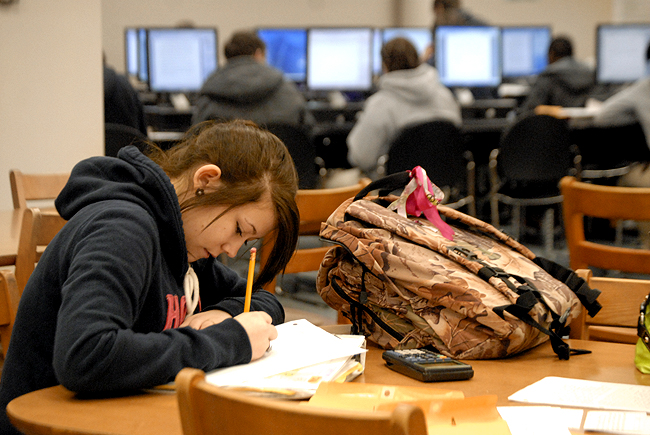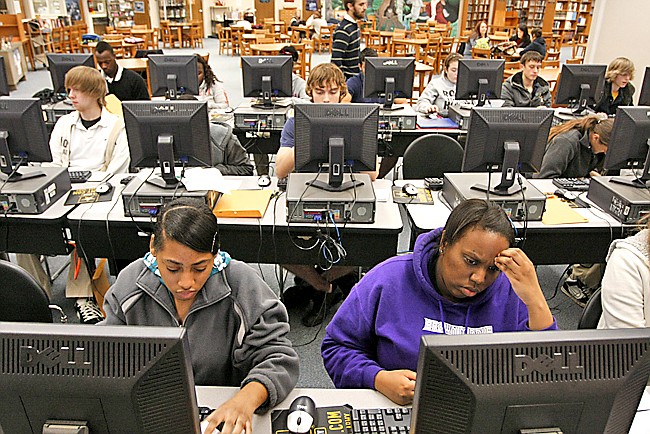 Due to a lack of computers at Central High School and a large class, Jessica Henson writes her senior paper as other students in her 12th grade English class use computers. Her class consists of 33 students, but the library provides only 20 computers.
Staff Photo by Allison Carter/Chattanooga Times Free Press
Due to a lack of computers at Central High School and a large class, Jessica Henson writes her senior paper as other students in her 12th grade English class use computers. Her class consists of 33 students, but the library provides only 20 computers.
Staff Photo by Allison Carter/Chattanooga Times Free PressCentral High School senior Amber Forester remembers having only about 20 students in her freshman English class.
Back then, she got more of the one-on-one time with her teacher that she prefers and there were fewer distractions.
Now enrolled in 12th-grade English, Forester, 17, shares her teacher with 32 other students. On a recent day in the library, there were only enough computers for about half of her classmates to work on their research papers, so Forester sat at a table with a friend, writing out her paper by hand.
Like many English and math classes at Central High School, English 12 is closing in on 35 students - the maximum number the state allows for a high school class. After several years of losing one to three teachers a year because of budget cuts while enrollment rose, classes at Central have gotten larger, Principal Finley King said.
"It's hard to address individual students' needs when you've got that many kids; the larger the classes, the less personalization you have," King said. "We're having to do more with less."
For years, Hamilton County has taken pride in smaller class sizes and schools, but officials say that luxury may be a thing of the past. As long as the school system continues to cut its budget year after year, class sizes won't be shrinking any time soon, said spokeswoman Danielle Clark.
Between 2010 and 2011, the average middle and high school classes rose by one or two students, Clark said, while elementary classrooms that grew did so by about one student.
U.S. Secretary of Education Arne Duncan acknowledges that class sizes will keep growing. But it's a change he said the nation's parents, students and teachers must get used to.
Duncan suggested that schools think outside the box and reduce class sizes based on the skill of the teacher, or use part-time staff to decrease class sizes during "critical reading blocks."
"I anticipate that a number of districts may be asked next year to weigh targeted class size increases against the loss of music, arts and after-school programming," Duncan said in a November speech to the American Enterprise Institute. "Those tough choices are local decisions."
Duncan also suggested that class size may not be as important as educators once thought. He pointed to data on high-performing schools in Asia, which have far more students in each class than the average American classroom.
"Secondary school classes in South Korea average about 36 students. In Japan, it's 33 students per class," he said. "In the U.S., it's 25 students per class. In fact, teachers in Asia sometimes request larger class sizes because they think a broad distribution of students and skill levels can accelerate learning."
But Ryan Litchfield, who teaches English 12 at Central, said no amount of research will convince him that larger class size has no impact on students.
"Research may say that class size doesn't matter, but as a teacher, I have no idea how that's possible," he said. "What they're saying, I believe, is that your time with students doesn't matter, or the amount of time you have with individual students doesn't matter. Because [larger class sizes are] definitely limiting."
Kyle Young, one of Litchfield's students, said there is at least one benefit to larger classes.
"If I'm in a bigger class, I'm more intimidated, but I'm also motivated to impress my peers," the 17-year-old said. "In smaller classes, I'm more comfortable, but less motivated."
Classmate Lauren Liles, 18, said it's interesting to get a variety of opinions in larger classes, but still, they're not her favorite.
"I like to get personal with my teachers, to show them I'm serious about my grades. But with more students, it's harder to get around to everybody," she said. "We're all pretty used to it by now."
